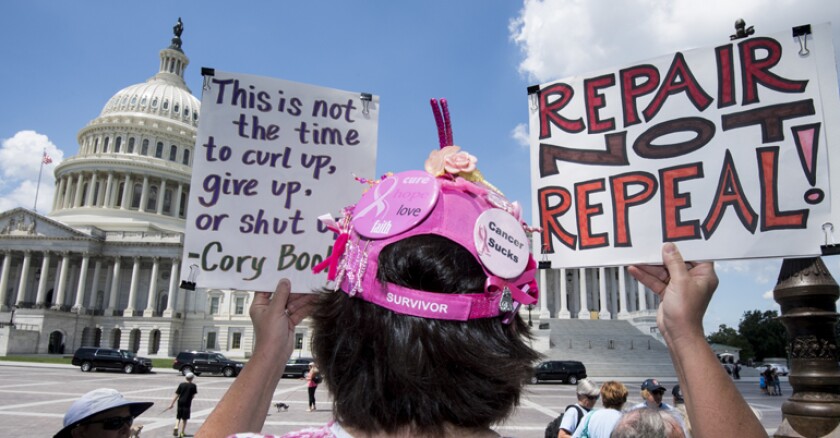But three months into most states’ legislative sessions, those promises have yet to be met.
In California and New York, two states widely expected to introduce (and pass) an individual mandate, legislation has yet to be introduced. In most of the six places where it has been brought to the table, bills are either stuck in committee or their passage is uncertain.
Health policy experts attribute the waning enthusiasm to the unpopularity of the individual mandate. In November, 55 percent of Americans supported the Republicans' plan to repeal the individual mandate as part of their tax overhaul.
“The individual mandate provision has been the most unpopular provision of the ACA, even in blue states. So there are political risks to enacting one," says Sabrina Corlette, research professor at Georgetown University’s Center on Health Insurance Reforms.
Without the mandate, the Congressional Budget Office estimates that, over the next decade, premiums will rise by 10 percent a year in most years and the uninsured population will increase by 13 million.
Currently, Connecticut, Hawaii, Maryland, New Jersey, Washington state and Washington, D.C., are considering bills to bring back the mandate.
The District of Columbia is the furthest along in the process. Mayor Muriel Bowser established a working group after the tax bill passed to look at the impacts of an individual mandate and whether it would be worth pursuing. The working group -- which included health care stakeholders -- unanimously voted in favor of establishing one, and now the fate rests with the D.C. City Council.
Even if it passes in D.C., though, Congress -- which repealed the individual mandate to begin with -- could block the law from taking effect.
Three thousand miles away, Washington state passed a bill in the Senate in February -- but with some major caveats. The bill initially required Washington residents to have health insurance, but it now instead instructs the legislature to look into how they could implement an individual mandate in the future. It's now awaiting a vote in the House.
The pushback in Olympia is in large part because there is no state income tax in Washington. The federal individual mandate was enforced through federal income taxes, so without a state income tax, it isn’t clear how the Washington mandate could be enforced.
In Hawaii, two bills introduced last year in the House and Senate to protect the major tenets of the ACA -- including the individual mandate -- have been rolled over into this session but have yet to make it out of committee.
Maryland was the first state to file legislation to restore the mandate in January, but it hasn't gotten far: Neither the House nor Senate version has made it out of committee.
Maryland’s bill, however, is unique: It would allow the $700 tax penalty for forgoing coverage to be used as a down payment for a plan on the marketplace. (The most popular marketplace plan in Maryland costs $475 a month.)
State Sen. Brian Feldman, a Democrat who sponsored the legislation, said earlier this month that there’s a lot of momentum in the Democrat-dominated statehouse. The state has a Republican governor, but Feldman is optimistic that he might sign it if given the chance.
“The governor has not been critical so far. He’s looking for a bipartisan solution,” he says.
Gov. Larry Hogan, who is known for his pragmatism, encouraged the legislature to find ways to stabilize the marketplace and keep residents covered. He has stopped short, however, of fully endorsing an individual mandate.
New Jersey is perhaps the second-closest to implementing a mandate. A bill made it out of committee and onto the Senate floor, where it's awaiting a vote.
“The prospects are good, the timing is good. It may well be an apolitical issue because it’s unclear how strongly Republicans in the legislature will politicize it. We’ll see,” says Ray Castro, director of health policy at the New Jersey Policy Perspective, who testified in favor of a mandate.
Castro, however, also suggests that revenues generated from the penalty should be used to make insurance affordable -- similar to Maryland’s bill. Right now, New Jersey's bill proposes revenues go toward a reinsurance fund, which helps insurance companies pay for the most expensive patients.
Connecticut held a hearing on its individual mandate proposal on Thursday, but state Rep. Sean Scanlon -- the bill's sponsor -- says it’s anyone’s guess if the bill will pass this session.
“This is going to be one of the more controversial bills. I would just say that it’s a vote for increasing premiums if you don’t support it,” he says.
Even if just one or two states end up enacting an individual mandate, that’s still impressive for progressive health advocates, says Jason Levitis, who managed ACA implementation for the U.S. Department of Treasury during the Obama administration.
But both Levitis and Corlette, from Georgetown, believe the chances for this kind of legislation will improve with time.
“I think it may be too late to have a mandate operational in time to affect 2019 rates. So if the 2019 window has closed, then the pressure to get something done right away is less," says Corlette.
“There's reason to believe that the stars will be better aligned next year," says Levitis, "with more time to prepare, the 2018 elections behind us and 2019 premiums making stark the real-world impact of [not having a] mandate."
Indeed, officials in Vermont have already said they are open to the conversation for an individual mandate if their insured rate drops dramatically in the coming year.
This is part of the Health newsletter. Subscribe for free.
*CORRECTION: This has been updated to clarify that while Congress has the power block legislation passed by the D.C. government, D.C. bills can still become law without Congressional approval.









